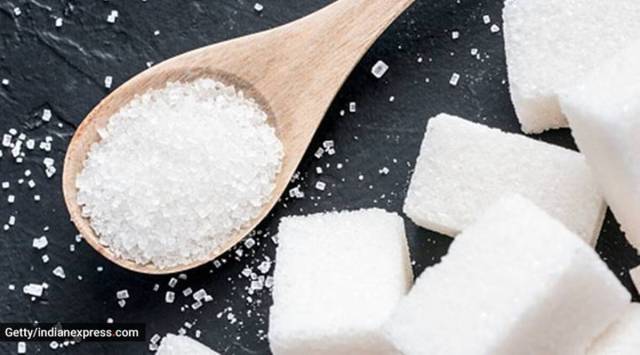📣 For more lifestyle news, click here to join our WhatsApp Channel and also follow us on Instagram
What happens to the body when you give up sugar for a month?
"When you completely give up sugar for a month, several changes may occur in your body," said Ankita Ghoshal Bisht, Dietician in Charge, Primus Super Speciality Hospital
 Sugar is a major contributor to excess calorie intake (Source: Getty Images)
Sugar is a major contributor to excess calorie intake (Source: Getty Images) Our dependence on sugar has become a pervasive aspect of our modern lifestyle. From sweetened beverages and processed snacks to our regular sweets, sugar has crept into all aspects of our diet. However, this heavy consumption of sugar comes with detrimental health effects, including obesity, diabetes, heart disease, and other chronic health conditions. As such, it becomes crucial to be aware of the negative impact of sugar and make conscious choices to reduce our intake for our overall well-being.
In a situation like this, should one consider eliminating sugar from their diet completely? Moreover, what changes can one expect in their body if they stay away from sugar for a month, to begin with? We reached out to experts to know more. “When you completely give up sugar for a month, several changes may occur in your body,” said Ankita Ghoshal Bisht, dietician in charge, Primus Super Speciality Hospital.
*Improved blood sugar levels: Cutting out sugar can help stabilise your blood sugar levels, reducing spikes and crashes that can affect your energy levels and mood.
*Weight loss: Sugar is a major contributor to excess calorie intake. By eliminating it, you may experience weight loss, especially if you were consuming a significant amount of sugary foods and beverages.
*Reduced cravings: Sugar can be addictive, and eliminating it from your diet can help reduce cravings over time.
*Improved energy levels: Relying less on sugar for energy can lead to more sustained energy levels throughout the day.
*Better dental health: Sugar is a primary cause of tooth decay, so avoiding it can contribute to improved oral health.
*Potential for improved skin health: Some individuals report clearer skin and reduced acne when they reduce their sugar intake.
 Sugar can be addictive, and eliminating it from your diet can help reduce cravings over time. (Source: Getty Images)
Sugar can be addictive, and eliminating it from your diet can help reduce cravings over time. (Source: Getty Images)
Agreeing, Dr Aniket Mule, consultant, Internal Medicine, Wockhardt Hospitals, Mira Road said that cutting back on added sugar is a smart approach to lower blood sugar and insulin levels, even if just for a short period of time. “If you are overweight, you are more likely to have high cholesterol levels, especially triglycerides, a form of fat in your blood. Reduce your intake of added sugar to reduce calories and body weight, which may improve your cholesterol. But it’s not just about losing weight. Even when they were the same weight, persons who consumed less than 20 per cent of their calories from added sugars had lower triglycerides,” he said.
However, Dr Mule emphasised that if you cut off added sugar for 30 days only to revert to a high-sugar diet when the challenge is done, you will soon lose these benefits.
Highlighting the same, Dr Abhijit Bhograj, Consultant, Endocrinologist, Diabetes and Thyroid, Manipal Hospital, Hebbal, Bangalore said that stopping sugars for one month has various benefits but only for a short term. “In order to get long-term benefits, we need to make these goals long-term.”
Bisht, however, said that whether or not it is suggested to completely give up sugar for a month depends on your specific health goals and circumstances. “For most people, reducing added sugars is generally recommended for maintaining overall health. However, completely eliminating all forms of sugar from your diet can be challenging and may not be necessary for everyone,” she said, adding that it’s important to find a balanced approach that works for you.
If you are planning to cut off sugar from your diet, the dietician suggested the following alternatives:
*Natural sweeteners: Options such as stevia, monk fruit extract, and erythritol are low-calorie sweeteners that can be used as alternatives to sugar. These sweeteners have minimal impact on blood sugar levels.
*Fresh fruits: Fruits contain natural sugars along with fibre, vitamins, and minerals. They can satisfy your sweet cravings while providing nutritional benefits.
*Spices: Using spices like cinnamon, nutmeg, and vanilla can add flavour and sweetness to your dishes without adding sugar.
*Dark chocolate: Opt for dark chocolate with a high percentage of cocoa (70 per cent or more) as it contains less sugar compared to milk chocolate.
*Unsweetened beverages: Choose water, herbal tea, or unsweetened coffee instead of sugary drinks like soda or juice.
“Remember, moderation is key even with healthier alternatives. It’s important to read food labels, be aware of hidden sugars, and maintain a balanced and varied diet overall,” she said.
📣 For more lifestyle news, follow us on Instagram | Twitter | Facebook and don’t miss out on the latest updates!
📣 For more lifestyle news, click here to join our WhatsApp Channel and also follow us on Instagram



- 01
- 02
- 03
- 04
- 05
























